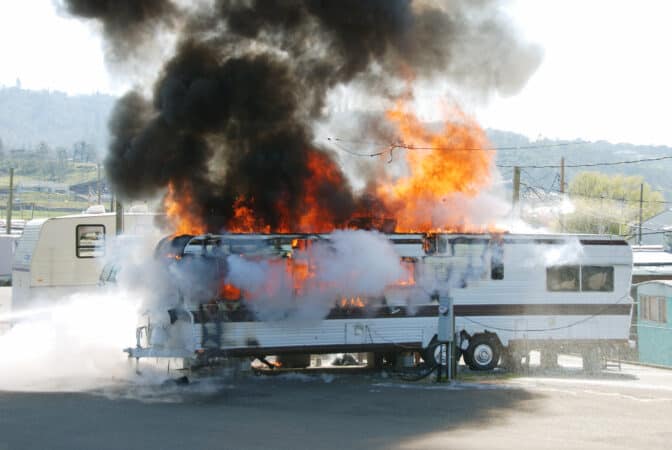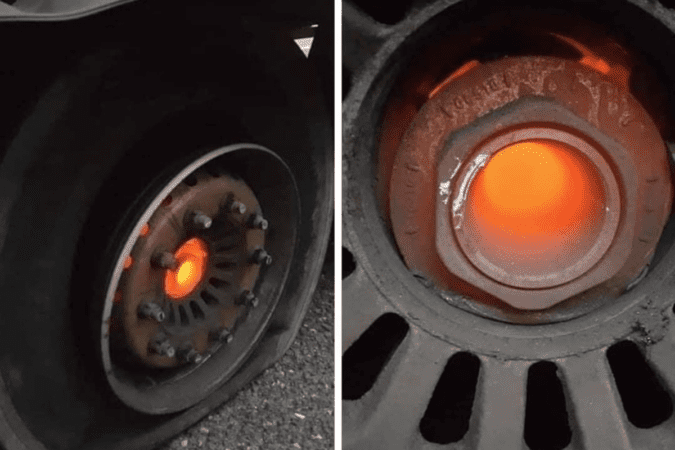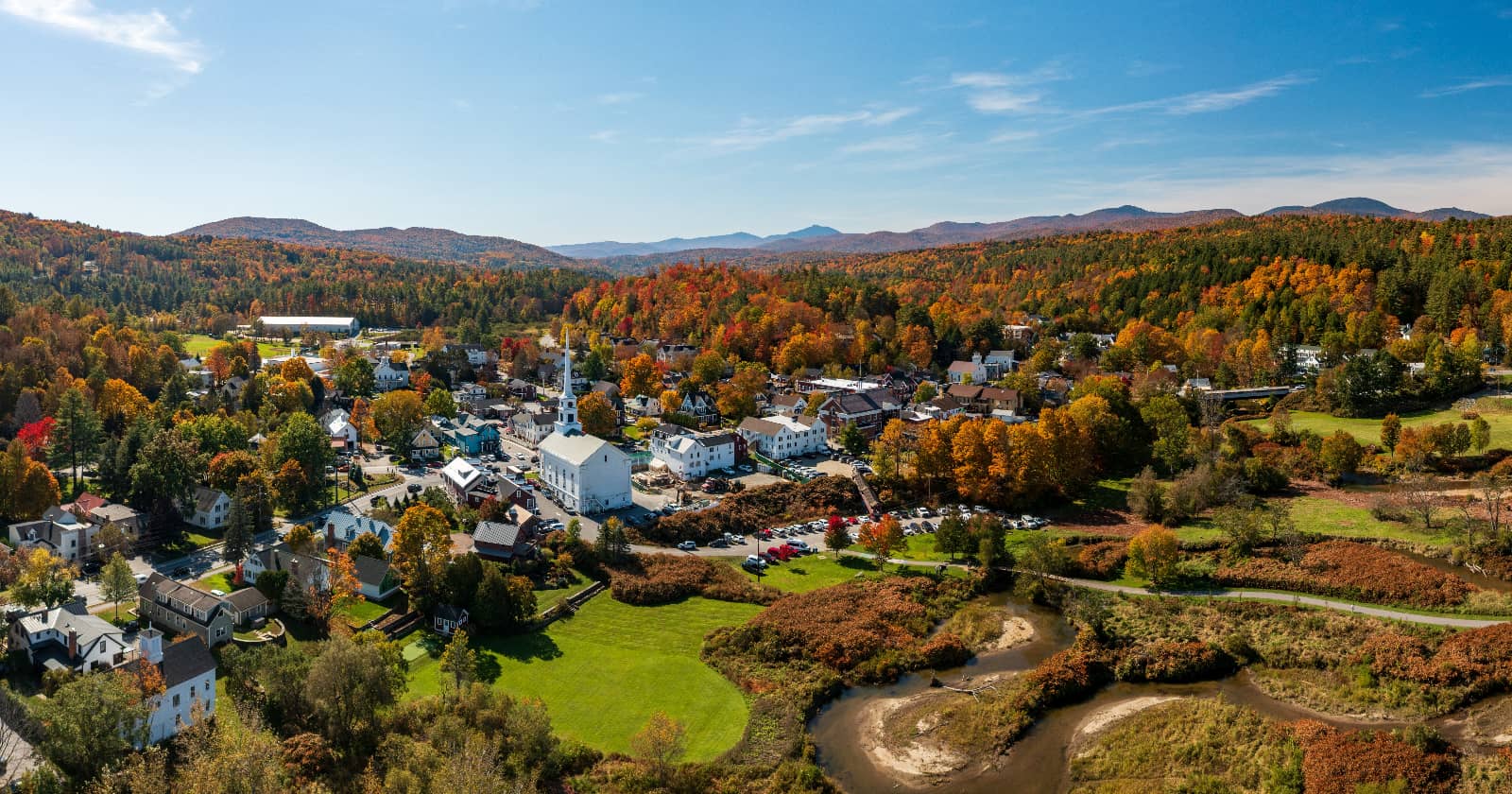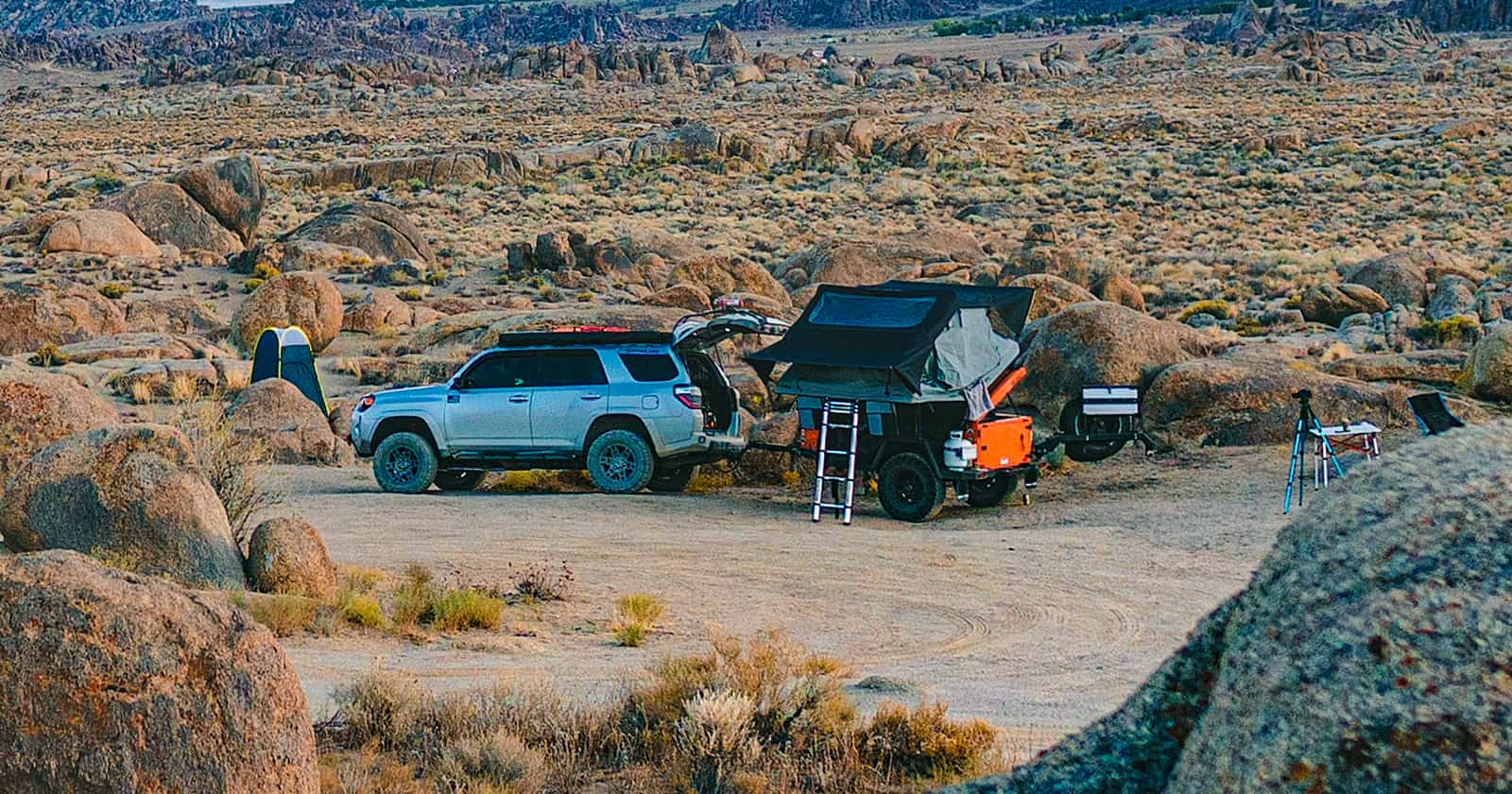Make sure your RV is safe and protected against fire. In most cases, RV fires result in complete loss of property. It is critical to ensure your RV is protected and your family is educated on RV fire safety in the event of an RV fire.
A fire is something we all hope to never have to experience. Modern RVs are equipped with many safety features and technology to reduce the risk of accidental fire. Unfortunately, this of course does not fully eliminate the possibility of an RV fire.
The best thing you can do as a responsible RV owner is to educate yourself on RV fire safety. You wouldn’t ignore an electrical or gas problem in your house that could contribute to the possibility of fire, and your RV should be no different.
… fire is one of the leading causes of RV loss in the U.S. today. The National Fire Protection Association (NFPA) estimates that nearly 2,000 RV fires occur annually.
Fire Prevention 52: RV Fire Safety 101
In the event of a house fire, when responded to in a timely manner, fire can be isolated and often extinguished without total loss. This is greatly due to multiple factors. One major factor is the proximity of fire response to residential areas. The other is the ever-progressing materials and building codes used in residential construction.
RVs, regardless of price, are built cheap. The walls are paper-thin in comparison to bricks-and-stick homes and fire is not a major consideration, if at all. Combine this with the odds of you camping not close by a fire station and the result is more often than not complete loss of property. Anyone who has witnessed an RV fire has probably been shocked at how quickly it went from smoke to a metal frame.
RV owners must be aware of the possible causes of fire and of course, what to do in the unfortunate event they have to deal with one. Let’s break down the two and make sure RV fire safety is at the top of your list!

What are the Main Causes of RV Fires?
Before we begin let’s be clear, RVs are safe and not at high risk of fires. We don’t go to sleep at night in our homes anxiously worrying about a fire in the night. The vast majority of RV owners will go their life without the need to deal with a fire. Our goal here is to educate on fire prevention and be prepared in an absolute worst-case scenario.
The three main internal sources of potential RV fires are the:
- Brakes/bearings
- Electrical systems
- Gas systems
Having a basic understanding of how they work and what they operate in your RV is necessary not only for RV fire safety but more general maintenance and troubleshooting. There are lots of resources for RV owners to familiarize themselves with these systems and all RV owners should do so.
Brakes & Wheel Bearings
When towing an RV, the brakes and wheel bearings generate heat. While this is normal, it should be within reason. Brakes or wheel bearings that overheat can start a fire to the tires and the area surrounding them.
While driving, it’s a good practice to stop and do wheel checks periodically. If the brakes or wheel bearings overheat, this heat will transfer to the wheel. A warm wheel is normal but if it burns or there’s visible overheating (picture orange hot metal) of the brakes or wheel bearings, stop – there is a problem!
RV fires most often started in engine, running gear and wheel areas (28%)…
U.S. Fire Administration

Electrical Systems
Electrical fires are limited in RVs by manufacturers using the correct wires, breakers, fuses, and other electrical components. RV electrical systems are complex and designed to ensure the proper current is flowing, sufficient wires sizes are distributing it, resisters and relays are monitoring and directing it, and on and on.
For the average RVer, the basic knowledge is that there is a 12-volt system related to battery power, and a 120-volt system related to shore power. Without making modifications, the electrical systems are engineered to safely operate. Once a circuit is added or modified, the potential for issues increases.
Electrical fires can be ignited from sparks or overheating of wires or components. These fires can move quickly through circuits and because wires are routed through walls and ceilings, they can be hidden from plain sight and often ignite other materials and components.
Gas Systems
Gas is what many people think of and worry about when it comes to fire in RVs. Why? Well, gas is highly explosive and easy to miss as it can go unseen, unheard, and unscented. For these same reasons your RV gas system often goes unmaintained. (Out of sight, out of mind).
We’ve all heard the stories of older RV furnaces leaking gas into RVs or bursting into flames when being lit. Fortunately, newer RVs have safer systems (including furnaces), to highly reduce the possibility of these things happening.
RV gas systems start at the propane tanks and run under your RV to the various appliances requiring fuel. Your stove/oven, fridge, furnace, and water heater can all require gas. RV gas lines are metal and have multiple connectors and fittings throughout the system. These connections are the most likely places for a leak.
Gas valves, such as the one for the furnace, have safety mechanisms to prevent gas from flowing if it’s not being burned. Other such safety features include sensors on appliances to react to a loss of heat from the flame to cut the supply of gas.
Outside of these three internal sources of fire is the most common cause of RV fires and that, of course, is humans.
Human Caused Fires
In the case of many fires, the source is not a leaking gas line or electrical short, but rather humans. Cigarettes, candles, cooking, and overloaded circuits are just some of the human fault causes of fires. RV component fires can also be the fault of humans due to lack of maintenance or ignoring problems.
Leaving gas valves open on the stove, grease fires while cooking, and forgetting a candle or placing it close to flammable items are easily done. The result of seemingly innocent actions can spell the end of your RV – and possibly worse!
RV fire safety can be overlooked until you or someone you know has a close call. Proactively taking precautions, and having your RV in safe working order and equipped with fire response items is key.
Engine Fires – Motorhomes & Camper Vans
If you have a motorized RV then you have to also consider the possibility of an engine fire. This also pertains to your tow vehicle in the case of towable RVs.
Proper maintenance, in most cases, will limit the chance of engine fires. At the first sign of an engine fire, you need to pull over to a safe area and exit your vehicle. Be aware that opening the engine hood can worsen the situation. If don’t have a way to extinguish the fire, it’s best to leave the hood closed and call help.
Fuel ignition, and as a result explosion, is a real possibility with engine fires. For this reason, retreating to a safe distance is important. Having an extinguisher in the cabin of your motorhome or tow vehicle is important for quick response.
How Do You Prevent RV Fires?
Human error is going to be the most likely cause of an RV fire. That being said, it’s on you as a responsible RV owner to practice safe RVing. There are some very basic things RVers should do and make habit of in adding to fire prevention.
Must-Have RV Fire Prevention Tools
There are a number of must-have fire prevention tools that you should have in your RV.
Not only should you have smoke and gas detectors in your RV, but you should ensure that they’re operating correctly and not expired. Smoke and gas monitors are standard in RVs however many go unchecked. The only detector that will save you from fire is one that actually works.
RV fires most frequently occurred during the afternoon, peaking from 1 to 3 p.m.
U.S. Fire Administration
Another must-have tool is to have fire extinguishers in your RV. As with the smoke and gas detectors, fire extinguishers do have expiry dates and can require recharging. Make sure when you’re buying one to get the correct class of fire extinguishers and one large enough for more than just a tiny fire. One fire extinguisher is a must and multiple are better. Also, consider having an outdoor extinguisher for quick access if needed.
Decorative fire extinguishers that are designed to fit into your decor and be thrown are a great way to add additional fire protection. These should only be used in addition to standard fire extinguishers though.
Lastly, handheld gas monitors are a smart investment for RV owners. They can help locate possible leaks or unburnt gas in appliances so you can prevent a fire at its possible ignition source.
Important Fire Prevention Tips
In addition to having fire-stopping tools, there are fire presentation tips and habits you should get familiar with.
Always double-check the gas valves are closed when you are finished cooking and before heading to bed for the night. If you notice a valve was left on, open some windows and exit the RV to let it air out.
Be careful when you’re cooking with grease, and clean up the cooking area when done or if there is a spill. Grease is highly flammable. Don’t leave your RV while you have things on the stove. Make sure to use your range hood fan and open the windows while cooking to pull greasy air out.
Not smoking in your RV is the best way to avoid accidental cigarette fires. Not only does it eliminate a fire risk, but it’s great for resale! It is, however, your RV and if you choose to smoke inside, use a proper ashtray that won’t tip over and fully extinguish cigarettes when done.
The electrical circuits in your RV are designed for a certain amount of power use. Avoid having multiple high-power drawing items in use at the same time. The multi-plug electrical outlet plugs you can buy should be avoided if possible. We have all heard stories of cheap chargers for phones and electronic devices starting fires. Make it a habit to use high-quality charge plugs and cords approved for use in North America.
What Should You Do in The Case of a RV Fire
Even with fire prevention measures in place, there is still the chance of having to deal with an RV fire. This can be a stressful situation and response time is key.
As with any emergency, the first thing is to do or more accurately not do, is panic. Easier said than done but a panicked person will not think and act as rationally as a calm person.
Alerting everyone about the fire should be done immediately to remove them from the RV or area. If safe, assign one person to close the gas supply and cut electricity to the RV when they exit the RV. At this same time, a quick assessment of the fire should be taken. Don’t be a hero and be realistic about the size and source of the fire. Your 10-pound fire extinguisher has its limits – as do you.
If the fire is beyond control, fire rescue should be called immediately and you and everyone in the area should move to safety. When at a campground or RV park, this includes surrounding RVers.
If the fire is small or just igniting, position yourself so you have direct aim at the fire with your extinguisher and also a means of egress in the case the fire spreads. Use a sweeping motion directed at the base of the fire until it’s fully extinguished. Closely continue to monitor the area after for possible reignition.
The most important thing is always the safety of people followed by the safety of the RV.
RV Fire Safety Checklist
To sum things up and help you educate yourself and your family on RV fire safety, here is a checklist of things to consider when assessing your fire prevention and readiness:
- Have a fire plan and practice it. Make sure everyone is familiar with the location and use of extinguishers and emergency windows. Can everyone open the emergency windows? If they have to make a quick exit, can everyone get out through the window?
- Check all detectors and extinguishers for expiry dates and proper operation.
- Be diligent with your RV maintenance especially the brakes, wheel bearings, gas, and electrical systems. An app like RV LIFE Maintenance is a great tool.
- Reguarly check the wheels for excessive heat while towing.
- Use safe cooking practices.
- Know your location and who to contact in case of fire.
RV fire safety should be taken seriously and revisited frequently. Being prepared and using fire prevention practices should become second nature. With everything in place, you can relax and enjoy your RV adventure.





With the narrow passages in some RVs it is easy to accidentally open the propane knobs going to the stove when you squeeze past them. May want to consider removing the knobs when not in use…
No mention of the after market fire suppression systems available for engine compartments and all electrical compartments. They may not extinguish a fire but they can give you that extra 30 seconds needed to escape alive.
I found the article to be informative but, not all gas lines are metal in new RV’s. My 2021 Salem Cruise Lite came with a rubber gas line that runs the length of the RV with several junction blocks.
The article states that gas (aka propane) is unscented??? Definitely this is not correct.
This article also does not mention the biggest cause of fires which is the rv refrigerator. My friends son is a highway patrol trooper and he told me that their training class stated that approximately 60% of rv fires are started by the refrigerator. As a retired volunteer fire officer I would agree.
Thank you for this article. Three days ago at 1:30 am, two RVs burned in the camp ground we are staying at. No one knows why it started, but the explosion and destruction of the two RVs was immediate a matter of 30 minutes. The only thing left is metal frames. Another article detailing the need to escape, means of escapes and exit plans is warranted.
well done
Thank you. Great knowledge. Good word. Much to be learned and respected.
Please continue posting articles of this nature. Life is precious. Let’s be Careful intentionally!
Hello,
Is there a fire safety class for RV’s?
David
[email protected]
Fire suppression systems like race cars use are great.
I had an engine fire in one motorhome & an electrical in another. Extinguisher saved me both times.